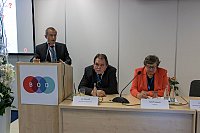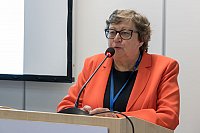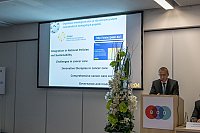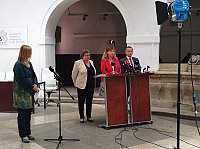20. 06. 2018 – 20. 06. 2018 | Prague
The stakeholder meeting of Czech partners involved in the iPAAC Joint Action took place in the Chamber of Deputies of the Parliament of the Czech Republic on 20 June 2018. This event was preceded by a dedicated conference session in Brno and followed by a press conference in Prague.
Current state of organisation of Czech cancer care
Recent developments in cancer care organisation in the Czech Republic were discussed at the session “Cancer Epidemiology, Organisation and Reimbursement of Cancer Care” of the 42nd Brno Oncology Days (BOD) conference, which was held in Brno, Czech Republic, on 16–18 May 2018.
Assoc. Prof. Jana Prausova, MD, PhD, President of the Czech Society for Oncology (CSO), pointed out that Comprehensive Cancer Centres (CCCs) have now for many years been playing a key role in care provided to cancer patients in the Czech Republic. The criteria for Comprehensive Cancer Centres were approved by the CSO Board and published in the Bulletin No. 7/2008 of the Ministry of Health of the Czech Republic (MZCR). Multidisciplinary teams in CCCs determine how and where individual patients are to be treated. Subsequent follow-up procedures can be performed either in CCCs or in local healthcare facilities. However, the organisation of cancer care in the Czech Republic must become even more effective, not only because of rising rates of cancer incidence and prevalence; treatment costs have also been rising due to more expensive treatment procedures, technical equipment, pharmacotherapy, medical supplies and running costs. The Bulletin No. 13/2017 issued by MZCR in December 2017 defines the current list of CCCs and also introduces the status of the so-called Regional Cancer Groups (RCGs), National Cancer Centres (NCCs) and Specialised Cancer Groups (SCGs). A summary of the new concept of cancer care organisation in the Czech Republic is available at the website of the Czech National Cancer Control Programme.
The planned optimisation of cancer care is partly based on feedback obtained from the collection of data on ongoing treatment of cancer patients, diagnostic registries and drug registries. Moreover, the Czech National Cancer Registry (CNCR) is the main source of data on cancer epidemiology in the Czech Republic. All these data combined together provide high-quality information on cancer care quantity and quality, which is an essential prerequisite for further optimisation of cancer care.
Prof. Jan Zaloudik, MD, PhD, Director of the Masaryk Memorial Cancer Institute in Brno, Czech Republic, drew the audience’s attention to the fact that some modalities of cancer care are loss-making from the healthcare providers’ point of view, i.e. some procedures performed in hospitals are not adequately reimbursed by healthcare payers. Despite financial difficulties, however, healthcare in general has been steadily improving in the Czech Republic. In a country analysis of 35 European countries, which was performed in 2017 by the Health Consumer Powerhouse, 11 countries (all Western European) were scoring above 800 points of the maximum 1000. The first CEE country, the Czech Republic, kept closing in, in 2016 only 6 points behind Sweden in 12th place. As authors of this analysis noted, “the Czech Republic has always been the star performer among CEE countries, and in 2016 remains at #13 (780 points), only 6 points behind Sweden and leading the group of CEE countries, squeezing ahead of the United Kingdom.” [1]
Assoc. Prof. Ladislav Dusek, PhD, Director of the Institute of Health Information and Statistics of the Czech Republic (IHIS), pointed out that the cost-effectiveness index (CEI) of the Czech healthcare system is currently one of the highest in Europe. However, the ageing population will lead to a steadily increasing burden on the Czech healthcare system in general, and on cancer care in particular. Cancer prevalence is expected to rise not only due to demographic changes (as older age is an important risk factor for all types of cancer), but also due to steadily improving survival rates for many cancers. Survival rates for breast cancer, for example, are close to 100%, particularly in patients diagnosed at stage I. Higher numbers of patients with breast cancer or those with a history of the disease are therefore a consequence of a successful programme of breast cancer screening – and this applies not only to the Czech Republic, but also to all European countries that have already implemented their national programmes of breast cancer screening. Similar results can be expected from other cancer screening programmes, namely cervical cancer screening and colorectal cancer screening. Patients diagnosed at earlier stages of cancer are more likely to be treated successfully, which is very good news. However, all cancer survivors need to be followed up for the rest of their lives, which inevitably puts further strain on already burdened cancer care networks. This is just one of several reasons why the current European model of cancer care needs to be innovated and why the iPAAC Joint Action was launched in April 2018.
Stakeholder meeting in the Chamber of Deputies of the Parliament of the Czech Republic
A round-table discussion on the future of Czech cancer care was held in Prague, Czech Republic, on 20 June 2018. Organised by the Committee on Healthcare of the Chamber of Deputies of the Parliament of the Czech Republic and held under the auspices of Prof. Věra Adámková, MD, PhD, Head of the Committee, this discussion was mainly focused on priorities of the Czech Society for Oncology for the next four years, the management of care for cancer patients, with particular emphasis on a comprehensive approach to cancer care and the role of cancer centres, and the availability of modern therapies and related costs.
Assoc. Prof. Jana Prausova, MD, PhD, President of the Czech Society for Oncology (CSO), reminded the attendees that changes in the concept of cancer care are necessary not only in the Czech Republic, but also in other countries across the European Union. The iPAAC Joint Action, which was launched in April 2018, represents a continuation of two previous joint actions, namely EPAAC (2011–2014) and Cancon (2014–2017). Among others, iPAAC will focus on the integration of national policies and sustainability, various challenges in cancer care, innovative therapies in cancer care, comprehensive cancer care control, governance and models of cancer care. The current assessment of quality and outcomes of cancer care in the Czech Republic is based on international guidelines, recommendations and methodologies.
Dr Prausova also highlighted the fact that principles of the new organisation of Czech cancer care, which were published in the Bulletin No. 13/2017 of the Ministry of Health of the Czech Republic (MZCR), had been authored by experts from the Czech Society for Oncology. According to these principles, an effective communication is key to make sure that equally good cancer care becomes available all across the country. It is important to bear in mind that cancer care involves not only the application of highly specialised care, but also the provision of comprehensive diagnostic and therapeutic procedures, including surgical, radiation and pharmacological treatment options, high-quality diagnostics, symptomatic and palliative care. Good communication among healthcare providers, healthcare payers and healthcare regulators is essential in order to achieve further improvements in Czech cancer care.
Assoc. Prof. Ladislav Dusek, PhD, Director of the Institute of Health Information and Statistics of the Czech Republic (IHIS), briefly described the current epidemiological trends in various cancer types and concluded that cancer care will have to be reorganised quite thoroughly in order to cope with the growing numbers of cancer patients and survivors.
Better organisation of cancer care is key to future success
A press conference focused on the challenges in Czech cancer care, attended by Prof. Adamkova, Dr Prausova and Dr Dusek, was held in Prague, Czech Republic, on 27 June 2018. Some of the present journalists were surprised to hear that more than 85,000 new cancer cases are diagnosed each year and that more than 540,000 people live with cancer or a history of cancer in the Czech Republic. The good news is that cancer survival rates have been improving in the long term. However, rising numbers of cancer survivors who need follow-up care mean that the healthcare budget becomes even more strained. It will not be possible in future to provide the required volume of cancer care without an effective cooperation of healthcare providers – not only among hospitals, but also among hospitals and providers of primary healthcare, especially GPs. The new concept of Czech cancer care aims to support the motto of the Czech National Cancer Control Programme: “Right treatment for the right patient at the right time and in the right place.”
References
- Euro Health Consumer Index 2016. Health Consumer Powerhouse Ltd., 2017. ISBN 978-91-980687-5-7. Available from WWW: https://healthpowerhouse.com/publications/
Regional Cancer Groups (RCGs) are put together by CCCs in their respective catchment areas and mostly involve mutually cooperating providers of acute inpatient cancer care. Nevertheless, RCGs can also include other types of facilities involved in cancer care, such as follow-up inpatient care and palliative inpatient care, cancer diagnosis and cancer prevention. Cooperation within a RCG is bound by a contract and its main principles involve a transparent and clearly defined system of cancer care organisation, adherence to common procedures and protocols and multidisciplinary assessment of cancer patients, among others.
National Cancer Centres (NCCs) are designed as coordinating scientific and research institutes which have extended possibilities of international cooperation within the CCC network. In each given area, an NCC mainly acts as the national contact point for international cooperation and does not substitute the competence of either expert societies nor the network of CCCs.
Specialised Cancer Groups (SCGs) can be established to support interregional and nationwide organisation of care focused on specific cancer types. SCGs which will focus on the optimisation of care of a selected cancer diagnosis or a group of cancer diagnoses; these cooperative groups can only be established under the auspices of CCCs and must not disrupt their integrity.







